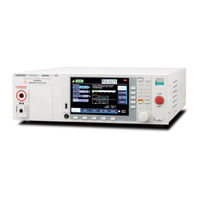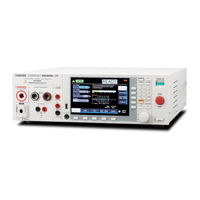Kikusui TOS9301 Manuals
Manuals and User Guides for Kikusui TOS9301. We have 2 Kikusui TOS9301 manuals available for free PDF download: User Manual
Kikusui TOS9301 User Manual (340 pages)
Electrical Safety Analyzer
Brand: Kikusui
|
Category: Measuring Instruments
|
Size: 18 MB
Table of Contents
-
-
Installation
25 -
-
-
Test Voltage55
-
End Voltage58
-
Frequency59
-
Upper Limit60
-
Lower Limit61
-
Test Time65
-
Offset78
-
-
Test
84 -
-
-
Test Current91
-
Frequency92
-
Upper Limit93
-
Lower Limit94
-
Test Time95
-
Offset100
-
Starting a Test101
-
-
-
-
Limit Voltage113
-
Frequency113
-
Band Pass Filter120
-
Low-Pass Filter121
-
Voltage Measure122
-
Precalibration127
-
Starting a Test129
-
-
-
-
Network136
-
Upper Limit141
-
Lower Limit142
-
Test Time144
-
Offset150
-
Starting a Test152
-
-
Current Test
159-
-
Network161
-
Upper Limit163
-
Lower Limit164
-
Test Time166
-
Offset171
-
Starting a Test173
-
-
Network179
-
Upper Limit184
-
Lower Limit185
-
Test Time187
-
Offset192
-
Starting a Test194
-
-
Meter Mode
201-
-
Network204
-
SELV Setting206
-
Offset209
-
Auto Test
215-
Setting Steps220
-
External Control
234-
-
Starting a Test242
-
Stopping a Test242
-
-
Memory Function
249 -
System Settings
258 -
Maintenance
279 -
Specifications
286 -
Appendix
315-
Timing Charts322
-
Options330
-
Multi-Outlet333
-
Brackets334
-
Troubleshooting335
-
Index337
Advertisement
Kikusui TOS9301 User Manual (290 pages)
Electrical safety Analyzer
Brand: Kikusui
|
Category: Measuring Instruments
|
Size: 10 MB
Table of Contents
-
-
Installation
24 -
-
-
Test Voltage51
-
Frequency54
-
Upper Limit55
-
Lower Limit56
-
Test Time60
-
Offset73
-
-
-
-
Test Current86
-
Frequency87
-
Upper Limit88
-
Lower Limit89
-
Test Time90
-
Offset95
-
-
-
-
Network104
-
Upper Limit109
-
Lower Limit110
-
Test Time112
-
Offset118
-
Starting a Test120
-
-
-
-
Network128
-
Upper Limit130
-
Lower Limit131
-
Test Time133
-
Offset138
-
Starting a Test140
-
-
Network146
-
Upper Limit151
-
Lower Limit152
-
Test Time154
-
Offset159
-
Starting a Test161
-
-
Meter Mode
168-
-
Network171
-
SELV Setting173
-
Offset176
-
Auto Test
182-
Setting Steps187
-
External Control
199-
-
Starting a Test207
-
Stopping a Test207
-
-
Memory Function
213 -
System Settings
219-
-
Screen Saver222
-
Key Lock223
-
Fail Mode226
-
Updating237
-
-
Maintenance
239 -
Specifications
246 -
Appendix
269-
Timing Charts276
-
Options280
-
Multi-Outlet283
-
Brackets284
-
Troubleshooting285
-
Index287

